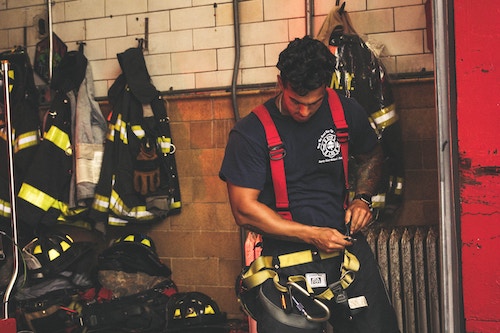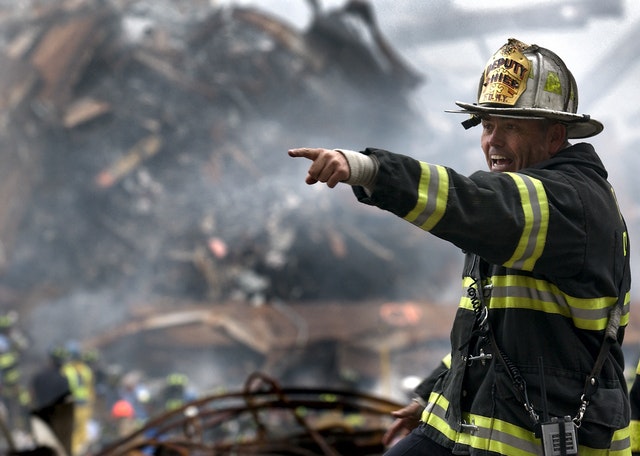Helping The Helpers
Are You A Worker In A Helping Profession Wondering How To Avoid Burnout?
Is burnout making it difficult for you to fulfill the responsibilities of your profession? As the enthusiasm and sympathy that initially drew you to your field of work wanes over time, are you wondering how to overcome compassion fatigue?
Are the long hours and constant physical demands of your job as a physician, teacher, domestic caregiver, or other “people worker” exhausting you? Or is the high-stress work environment as a social worker, mental health professional, police officer, firefighter, EMT, or other “help worker” leaving you feeling emotionally fatigued? Do you fear you may be suffering from post-traumatic stress or secondary trauma?
Do you tend to prioritize the needs of others over your own, so that you have forgotten how to take care of yourself? Perhaps you haven’t taken a vacation in a while, eat poorly, or struggle to set aside “me time.” As a result, you may be losing enthusiasm for your work. You may also be irritable, find it difficult to summon the same level of compassion you once did, or feel resentful toward the people you’re supposed to help.
Do you have high expectations about what you can or feel you should be able to accomplish? Maybe you have set the impossible goal for yourself of helping/healing everyone. And when you’re not able to meet that goal, you may feel disillusionment, guilt, or shame.
If you’re experiencing job burnout in your profession, you may have feelings of anxiety, depression, and doubt as well as physical symptoms such as fatigue, headaches, and sleep disturbances. You may even start to question the meaningfulness of your career or the suitability of your own performance. But changing careers isn’t the only solution.
Help Work Is The Hardest Work
Doctors, nurses, first responders, home caregivers, probation officers, police officers, firefighters, social workers, foster parents, teachers, and therapists are all “help workers.” These individuals sacrifice their own health and well-being as they do the honorable work of keeping their fellow community members healthy, happy, and safe.
This work can be fulfilling, but it also comes at a cost. According to Business Insider, careers in medicine, law enforcement, and mental health all tend to involve high stress. As a result, people in helping industries such as healthcare and law enforcement are more at risk for alcohol and drug abuse. They also tend to have higher suicide rates. Doctors, for example, have the highest suicide rates of any profession, according to the American Psychiatric Association.
Workers in helping professions often see above-average burnout rates and, given their exposure to violence and other life-threatening situations, are also at risk for post-traumatic stress disorder (PTSD). Even those who experience trauma indirectly, perhaps by hearing about it verbally, can suffer from secondary traumatic stress, which is also known as vicarious trauma.
People who pursue helping professions tend to be others-centered. This tendency toward self-sacrifice is a godsend for the people they help, but it can be a risk factor for self-neglect. Help workers are often so focused on others that they fail to consider the effects of their profession on their own mental and physical health. As a result, they may fail to recognize the exhaustion, cynicism, disillusionment, and self-doubt they’re experiencing for what they are—the warning signs and symptoms of compassion fatigue and burnout.
How To Overcome Compassion Fatigue And Avoid Professional Burnout
For some help workers, talk therapy with a professional counselor can help to avoid or overcome job burnout. Exercising, taking regular vacations, and eating right can also help, so we incorporate these recommendations into our practice.
For many people, though, self-care is only so effective. And simply talking about problems may not be enough to resolve them. If you’ve witnessed (or heard first-hand accounts of) abuse, car accidents, natural disasters, or other violent or life-threatening events, you’ve almost certainly experienced some level of trauma, even if indirectly. The emotional residues of this trauma reside in the subcortical brain, where traditional interventions such as talk therapy and self-care counseling can’t reach.
That’s why we recommend undergoing Brainspotting as part of compassion fatigue treatment. Brainspotting is a scientifically proven way to access the unhealed emotional wounds stored in the subcortical brain. By stimulating your visual field, our Brainspotting-trained therapists will access these wounds and trigger your brain’s innate ability to process and heal the emotions of anger, sadness, anxiety, fear, and grief often associated with traumatic events.
The old saying that you have to help yourself before you can help others is cliché but true. If you wait until you’re in full-on burnout mode before you come in for help, you risk not only your own health but also that of the people you’re trying to help. Ignoring your symptoms now could cause a mistake you’ll regret forever. On the other hand, getting the treatment you need can improve your mood, focus, and energy levels, resulting in decreased suffering, higher job satisfaction, and improved performance.
As you consider burnout counseling and compassion fatigue treatment, you may wonder. . .
The trauma I experienced was minor, indirect, or happened a long time ago. Won’t it heal on its own?
If you’ve experienced trauma, you might assume that healing will occur naturally over time. On the contrary, trauma is stored deeply in the subcortical brain and does not go away on its own. In fact, the accumulation of traumatic influences over time tend to add up. Waiting it out, talking with friends, or using drugs/alcohol will likely not help you. Until you address your unhealed emotional wounds at a deeper level, circumstances that remind you of your trauma will continue to trigger you again and again.
I’m supposed to be helping other people, not myself.
In my experience, many help workers would literally find it easier to run into a burning building than to walk into a therapist’s office. Sadly, the most compassionate people often don’t have a heart for themselves. In my experience, help workers tend to be overly dismissive of their own ailments, telling themselves that stress is normal and that everyone in their field gets down once in a while. As a result, the people most deserving of help often fail to seek it out.
The trauma happened to someone else, not me. What right do I have to be traumatized by it?
If you’re a first responder or often deal with the aftermath of traumatic situations, you may feel confused or guilty about how it has affected you. You may also think you’re being weak or overly sensitive. Additionally, you may even feel ashamed of how you feel. It’s true that some people are more likely to experience trauma than others, but that isn’t their fault. Ultimately, the cause of a person’s trauma is irrelevant. What matters is their willingness to face that trauma.
Get The Help You Deserve With Compassion Fatigue Treatment
You might be in the habit of putting others first, but you’re just as deserving of help as anyone else. There’s nothing wrong with setting aside time for your own healing and growth. You deserve love and support, and we would be honored to serve you just as you’ve so selflessly served others. As you allow yourself to be loved and cared for, you will strengthen your ability to love and care for others.
The Southern Colorado Hope for Healing Institute offers an experienced, compassionate staff. Our compassion fatigue therapists are specialized in burnout prevention and certified in Brainspotting. We serve adults and children coping with past trauma in Pueblo and Colorado Springs. For a free, 15-minute consultation or to schedule your first appointment, call us at 1-719-271-6677.
Relevant Blog Posts
Testimonials
“Before Brainspotting, I couldn’t leave my house or hold down a job because of my paralyzing anxiety. Now, I get out often, have a new job, got my dog back, and feel safe again. Amazing!!”
Manny D.
Trinidad
“Wow, things came up I did not anticipate. I’m not sure what happened, but my anxiety is now way down and my anger is gone!!”
Larry C.
Pueblo
“My anxiety and panic attacks were so bad I couldn’t work and was going to try to get on Social Security. After my BSP sessions with Dan, my anxiety and other PTSD problems are gone and I’m actually looking forward to going back to work. It’s like a miracle. Anybody who suffers from trauma like I did should go do Brainispotting with Mr. Dan!!
-Crystal C.
Pueblo





